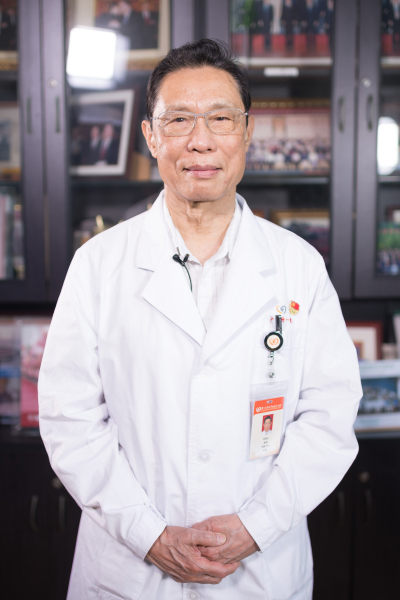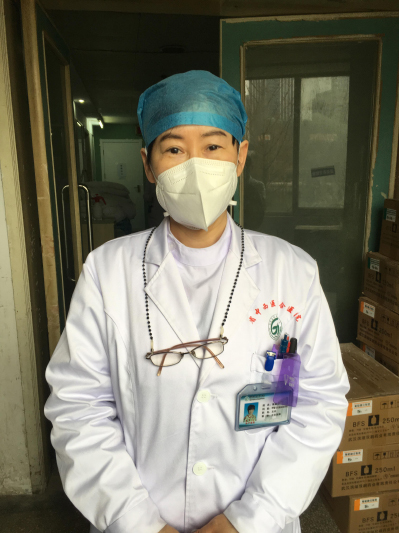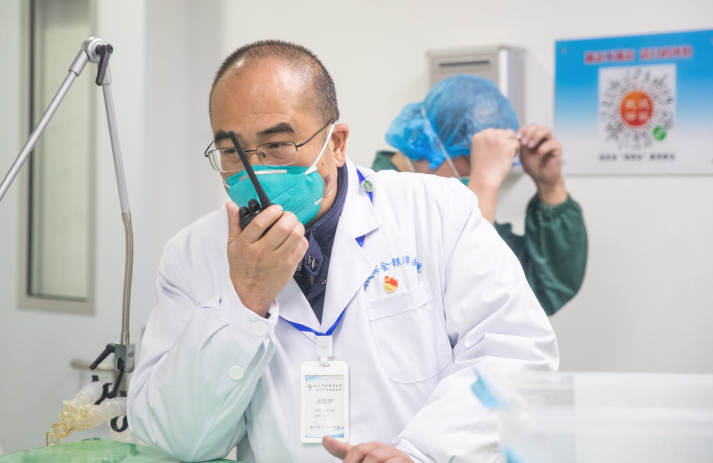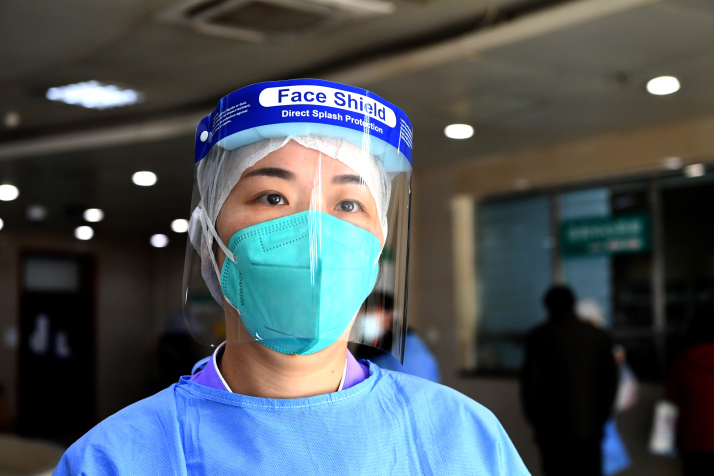|
||||||||||
| Home Nation World Business Opinion Lifestyle ChinAfrica Multimedia Columnists Documents Special Reports |
|
||||||||||
| Home Nation World Business Opinion Lifestyle ChinAfrica Multimedia Columnists Documents Special Reports |
| ChinAfrica |
| Brave Hearts |
| Individuals show commitment and courage in the fight against the deadly coronavirus epidemic |
| By Hu Fan, Ge Lijun & Li Qing | VOL.12 March ·2020-03-04 |
China's battle with COVID-19 epidemic has seen dedicated individuals stand up and be counted at critical moments, often endangering their own lives. ChinAfrica features four of these people on the frontlines of the epidemic, who fly under the radar, yet do extraordinary things.
Calm Presence
Top respiratory expert reassures the public with professionalism during the novel coronavirus epidemic

Zhong Nanshan (CNSPHOTO)
On January 18, 84-year-old respiratory expert Zhong Nanshan took a train to Wuhan, central China's Hubei Province, as confirmed cases of a disease caused by the novel coronavirus kept mounting in the city amid public concern about the nature and scale of the outbreak. The Spring Festival traffic rush had begun at the time and Zhong managed to get a seat in the dining car of the packed train.
A picture of him taking a nap in his seat went viral across China's social media and news of Zhong traveling to Wuhan in his expert capacity brought a sense of assurance to the public, with many saying that a solution was assured with his involvement.
Zhong made a name for himself 17 years ago in another similar emergency against the Severe Acute Respiratory Syndrome (SARS), an epidemic that started in South China's Guangdong Province and eventually claimed over 900 lives worldwide, including those of many medical practitioners. While doctors in many hospitals feared the very contagious and deadly disease, he demanded that patients in critical condition be sent to his team in a Guangzhou hospital.
During that fight against SARS, he formed China's first medical expert team and built the first isolation ward for the disease. He led the draft of China's first clinical standard for the disease and was the first to call for national and worldwide collaboration. His team created a record by working for 193 consecutive days, treating 302 SARS patients.
In January this year he was urgently dispatched to Wuhan as a member of the second group of experts sent by the National Health Commission (NHC), to find out what was really happening in the city, so that decisions could be made at the national level to react to the outbreak. The first group of experts sent to Wuhan had not been conclusive about the nature of the transmission of the disease. After his arrival in Wuhan, he spent a busy day attending briefings and visiting hospitals in the city, which he later warned were not to be visited unless it was for the extremely important. On January 20, he appeared at a press briefing in Beijing as NHC's head of high-level experts, where he confirmed human-to-human transmission of the virus and called for immediate actions to contain its spread.
This marked a turning point of reaction toward the disease. Top-level response was initiated among China's provinces in the following days and medical teams began to be sent to Wuhan's aid.
On January 24, a team was formed by the Ministry of Science and Technology to provide technological support and Zhong was appointed head of the team.
Although elderly, Zhong is highly active and takes part in research and clinic practices, as well as a daily fitness routine. This allowed him to join the frontline personnel who worked intensely spending long hours away from home at the expense of time with family and friends.
Despite the severity of the epidemic, Zhong is optimistic that the virus can be defeated. In an interview with Xinhua News Agency, the morale of Wuhan citizens in fighting the disease reduced him to tears. "With help from the whole country, Wuhan will get over this, because it is a city of heroes," he said.
Sounding the Alarm
Hubei doctor's swift action sends initial alert of the coronavirus

Zhang Jixian (FILE)
On the morning of December 26, 2019, an elderly couple visited Hubei Provincial Hospital of Integrated Chinese & Western Medicine. At that time, Zhang Jixian, head of the respiratory department of the hospital, was on duty. The couple had symptoms that appeared similar to those of the common flu. To double check, Zhang asked them to undergo a lung CT scan. However, the scan results showed something totally different from the regular flu.
When Zhang saw the results of the CT scans, she suspected something was wrong. This alertness came from her experience as a senior doctor. During the SARS epidemic period in 2003, Zhang was a member of the expert group in Jianghan District in Wuhan, capital city of Hubei Province. At the time, she visited various hospitals daily to investigate the new disease. She is therefore acutely aware of the risks linked to an epidemic situation.
Zhang asked the couple's son to come to the hospital and take the same test. Although he had no symptoms, the examination clearly showed that his lungs were infected. "In general, when a family comes to see a doctor, there is only one sick person. They do not all have the same disease at the same time, unless it is an infectious disease," said Zhang.
Her intuition was quickly confirmed. The same day, a trader from the Wuhan South China Seafood Market visited the hospital. His symptoms and the results of his lung scan were identical to those of the family. It was then that Zhang became aware of how dangerous the situation was. On December 27 she reported the situation to her hospital peers who immediately informed the Jianghan District Disease Control Center.
Over the next two days, the hospital received more people with similar symptoms. Zhang continued to report the situation to her hospital, offering to hold a multi-service consultation. At 13:00 on December 29, experts ascertained that, in addition to having similar symptoms, most of the infected patients had some sort of contact with the South China Seafood Market.
The experts made the decision to report the situation to the disease control departments of both provincial and municipal health committees. On the same day after receiving the report, the committees asked another group of experts to visit the hospital to officially launch an epidemiological investigation.
Zhang had already put in place quarantine measures. By the morning of December 27, the four suspected cases had been isolated separately. She also warned medical staff that, "the disease could be contagious" and asked everyone to protect themselves. Up until the beginning of February, when the epidemic worsened in Wuhan, not one member of Zhang's team was infected with the virus. As a respiratory doctor, Zhang inspected 160 patients daily to better understand the disease and formulate treatment plans. She also led her team to rescue seriously ill patients.
For more than a month, she suffered from a severe lack of sleep and exhaustion. Her team had to do four hours of difficult work each morning while wearing heavy protective clothing. There was little time to eat, drink or even to go to the bathroom.
However, despite this hard work, the team never gave up. "No one complained. Everyone was doing their best," Zhang said of her team. As the first doctor to report the novel coronavirus infection in Wuhan, she was awarded a merit for her performance in the fight against the pneumonia epidemic on February 6 by the Human Resources and Social Security Department and Health Commission of Hubei Province.
Racing Against Time
Doctor with ALS works on the frontline of battle against COVID-19

Zhang Dingyu (XINHUA)
On December 29, 2019, seven cases of pneumonia of unknown cause were referred to the Jinyintan Hospital in Wuhan. They were all related to the Huanan Seafood Wholesale Market.
As similar cases began to be reported in Wuhan, 57-year-old Zhang Dingyu, President of the hospital, was on high alert. His decades of clinical experience told him it was not an ordinary infectious disease.
He ordered to move the patients into an isolation ward. Examining their symptoms and analyzing the results, he realized the situation was worse than he had imagined.
The next morning, he urgently deployed more medical personnel in two new separated areas, admitting over 80 patients.
Including Zhang, over 600 medical workers at the hospital have overworked for more than one month. "We need to compete against time in order to get more patients back from the epidemic," he said.
Few people know it is also a personal race for Zhang, who has amyotrophic lateral sclerosis (ALS), a neurological disorder also known as Lou Gehrig's disease.
Zhang did not tell his colleagues except Wang Xianguang, another member of the hospital leadership, that he has ALS, which makes walking difficult for him. He did not want to affect others' work, especially in this critical phase.
On January 24, 150 medical workers from the Army Medical University in Chongqing were dispatched to the hospital as reinforcement, followed by a medical team of 136 from Shanghai taking charge of some wards. Their timely help relieved the pressure on the staff at the hospital, which also allowed Zhang to make his health condition public. The staff of the hospital finally came to know the real reason their chief could not walk normally. They had been told that he had a knee problem.
Telling the truth makes Zhang feel better. "I also want to tell people that if they take responsibility and push their boundaries, they can make things happen too," he said.
The intense work has worsened his health. He has felt his muscles atrophying. "I need colleagues to help me put on a protective suit as it is difficult for me to lift my legs," he told China Central Television. But he still told Wang not to stop him from working in the hospital.
"He said time is precious to him and he wants to do more meaningful things within the limited time," Wang said.
Zhang has been on the frontline of medical emergencies, including the Wenchuan earthquake in the southwestern province of Sichuan in 2008, and overseas medical relief missions to Algeria and Pakistan. He enjoys working with his colleagues and hopes to continue as long as he can.
Despite the brutal reality, he still holds a positive attitude. He said the last years of his life will be confined to the wheelchair or bed, so he needs to make full use of the present time to work and realize his ideas.
On January 13, Zhang's wife also developed symptoms of COVID-19 infection, which made him cry. She is a doctor working in another hospital in Wuhan. Believing she was in capable hands, Zhang chose to stay with his colleagues fighting against the disease.
"Maybe I'm a good doctor but not a great husband," Zhang said. When seeing patients suffering from the disease, he would worry about his wife, fearing of losing her.
Then the good news came that she had recovered. And with the efforts of the medical personnel at his hospital, over 70 patients have recovered and been discharged.
Because of his devotion to his job and contribution to the fight against the novel coronavirus epidemic, Zhang was awarded a merit by the Human Resources and Social Security Department and Health Commission of Hubei Province.
On the Front Line
A nurse infected with the novel coronavirus in Wuhan returns to work days after recovering

Guo Qin (CNSPHOTO)
Guo Qin is a nurse in the emergency care center at Zhongnan Hospital of Wuhan University, where she has worked for 15 years.
After a new type of coronavirus outbreak in her city, the 38-year-old was assigned to care for critically ill patients in the emergency center. Her shift stretched to more than 10 hours a day.
At the start of January, there were two to three times more feverish patients than usual at the hospital. As Guo's long work hours continued increasing, the risk of being infected by the virus grew daily.
On January 12, after finishing her shift late in the evening, Guo felt unwell. Her body temperature had reached 37.8 °C. The next day her temperature continued to rise and her whole body hurt, in addition to experiencing constant migraines. After being examined, it was confirmed that she had contracted the novel coronavirus, becoming the first worker in her hospital to be infected.
"I was a little nervous at the time because we knew so little about this disease," she said. "But I was not particularly afraid because I was in good physical condition."
When her diagnosis was confirmed, she was immediately placed in isolation, receiving antiviral and antibacterial treatment. On the first day of her isolation, Guo spent a sleepless night. "The constant steps of my colleagues [rushing about] did not stop for most of the night. I quickly forgot my fears and I just wanted to return to join them as soon as possible."
As this disease requires a 14-day observation period, she still had to self-isolate at home after she was discharged from hospital. During the entire quarantine period, she had to remain alone. Her family cooked meals for her, which they placed just outside her door.
While Guo was sick, the epidemic in Wuhan quickly escalated. Many medical staff members were infected, causing a serious shortage of front line personnel. She repeatedly expressed her regret that she could not be helping her colleagues.
On January 27, Guo completed her self isolation and observation period, and her physical condition returned to normal. She requested to return to the emergency center and continue to care for hospital patients. Back at work, she took the initiative to share her experience of isolation and treatment with her patients: "This disease is not so severe and can be cured completely. There is no reason to panic," she told them.
The day of her return to work also brought good news: a patient was successfully cured and discharged from her hospital. "This meant that we should be careful concerning viruses, but without going into panic mode," said Guo.
"Trust our medical staff. We are your strongest supporters," Guo often tells her patients.
Her parents, however, remain concerned. "You have to be responsible for yourself, you have to think about your children and your husband," they reminded her. But while aware of the risks she is taking, Guo said she is able to protect herself and trusts her team.
She now dedicates herself to the most dangerous tasks in the emergency center. She has to wear heavy protective gear for more than six hours a day, but has no regrets. "As frontline medical personnel, we have a responsibility to protect our patients. Saving people is our mission. Especially at this critical moment, we have to move forward, we cannot back down," she said.
(Comments to zanjifang@chinafrica.cn)
|
||||||||||||
| About Us | Contact Us | Advertise with Us | Subscribe |
| Copyright Beijing Review All rights reserved 京ICP备08005356号-5 京公网安备110102005860号 |